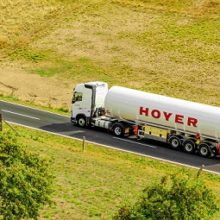
As a globally operating company, Hoyer knows the central importance of sustainable action in all steps of the logistics process. Therefore, its own “SHEQ and Sustainable Management” department takes oversight of the subjects of safety, health, the environment and quality, and since 2012 has been responsible for publishing an annual Sustainability Report. In this, the international logistics specialist declares key figures for the sustainability of the company’s activities, thereby documenting among other things the success of its strategic efforts to reduce CO₂ emissions and incident rates.
One of these endeavours consists of expanding intermodal transport: this comprised a 79.5 per cent share of the Hoyer Group’s total journeys in the most recent evaluations, enabling a highly effective decrease in CO₂ emissions. This reduction was supported by the use of Euro-6-compliant drive systems in more than 90 per cent of the overall vehicle fleet being used. Thanks to these two improvements, Hoyer achieved a new company record and was able to reduce transport-related emissions to below 20 grammes of CO2 per tonne-km for the first time. The target to reduce transport-related CO₂ emissions by 25 per cent within ten years is within reach. Another long-term target Hoyer is striving to achieve: the reduction of “main incidents”, i.e. very serious incidents, by 50 per cent in non-transport operations and by 25 per cent in transport operations. These goals should be achieved by the end of 2020. Interim results are positive, the confirming is currently underway.
Hoyer regularly reviews the standards by which it measures its performance as well as the scope and transparency of its reporting as part of its quality management. Hence, the logistics company is now taking the consistent step of widening the scope of measures published in the Sustainability Report to include CO₂ emissions arising through the use of energy in the company’s non-transport activities worldwide – e.g. in cleaning operations, depots and storage facilities. The previous, internationally recognised McKinnon method for collecting key figures is replaced by the GLEC framework (Global Logistics Emission Council). This method can more accurately calculate the individual emissions performance of the Hoyer Group’s activities. This change also paves the way for the ISO-50001 certification which Hoyer aims to achieve in Europe by 2022, and for all other global Hoyer operations by 2025.
As Mark Binns, head of group SHEQ and sustainable management makes clear: “Hoyer has not only an interest but also an obligation to contribute towards creating and using a sustainable future.” This obligation is also made clear through the company’s realignment to the United Nation’s “Sustainable Development Goals”, eight points of which have been laid down as its own targets. As well as climate protection and economic growth, these goals also include combating poverty, the promotion of education and an obligation to responsible consumption.

